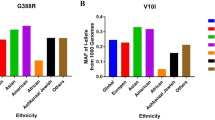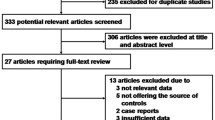Abstract
Transforming growth factor-β1 (TGFβ1) plays a significant role in regulating cellular proliferation and apoptosis. A large number of studies related to the association between TGFβ1 Leu10Pro polymorphism and prostate cancer (PC) risk, but get conflicting results. We performed a meta-analysis based on six studies, assessing the strength of the association using odds ratios (OR) with 95 % confidence intervals (CI). Overall, our evidence has indicated that TGFβ1 Leu10Pro polymorphism had significantly increased PC risk in the allele comparison model (OR = 1.081, 95 % CI = 1.003–1.165, P heterogeneity = 0.141, P = 0.041). In the stratified analysis by ethnicity, the same results were found among Caucasians (for heterozygote model, OR = 1.741, 95 % CI = 1.004–3.020, P heterogeneity = 0.000, P = 0.049; recessive model, OR = 1.339, 95 % CI = 1.045–1.717, P heterogeneity = 0.020, P = 0.021; allele comparison model, OR = 1.091, 95 % CI = 1.005–1.184, P heterogeneity = 0.048, P = 0.037). In conclusion, this meta-analysis suggested that TGFβ1 Leu10Pro polymorphism contributed to the development of PC. A well-designed and larger study is still required to evaluate this polymorphism and PC risk.







Similar content being viewed by others
References
Hsing AW, Chokkalingam AP. Prostate cancer epidemiology. Front Biosci. 2006;11:1388–413.
Miyazono K, Suzuki H, Imamura T. Regulation of TGF-beta signaling and its roles in progression of tumors. Cancer Sci. 2003;94(3):230–4.
Blobe GC, Schiemann WP, Lodish HF. Role of transforming growth factor beta in human disease. N Engl J Med. 2000;342:1350–8.
Boesen CC, Radaev S, Motyka SA, Patamawenu A, Sun PD. The 1.1 A crystal structure of human TGF-beta type II receptor ligand binding domain. Structure. 2002;10:913–9.
Grainger DJ, Heathcote K, Chiano M, Snieder H, Kemp PR, Metcalfe JC, et al. Genetic control of the circulating concentration of transforming growth factor type beta1. Hum Mol Genet. 1999;8:93–7.
Ravitz MJ, Wenner CE. Cyclin-dependent kinase regulation during G1 phase and cell cycle regulation by TGF-beta. Adv Cancer Res. 1997;71:165–207.
Wikstrom P, Damber J, Bergh A. Role of transforming growth factor-beta1 in prostate cancer. Microsc Res Tech. 2001;52:411–9.
Barrack ER. TGF beta in prostate cancer: a growth inhibitor that can enhance tumorigenicity. Prostate. 1997;31:61–70.
Fujii D, Brissenden JE, Derynck R, Francke U. Transforming growth factor beta gene maps to human chromosome 19 long arm and to mouse chromosome 7. Somat Cell Mol Genet. 1986;12:281–8.
Yokota M, Ichihara S, Lin TL, Nakashima N, Yamada Y. Association of a T29/C polymorphism of the transforming growth factor-beta1 gene with genetic susceptibility to myocardial infarction in Japanese. Circulation. 2000;101:2783–7.
Ewart-Toland A, Chan JM, Yuan J, Balmain A, Ma J. A gain of function TGF-B1 polymorphism may be associated with late stage prostate cancer. Cancer Epidemiol Biomarkers Prev. 2004;13:759–64.
Faria PC, Saba K, Neves AF, Cordeiro ER, Marangoni K, Freitas DG, et al. Transforming growth factor-beta 1 gene polymorphisms and expression in the blood of prostate cancer patients. Cancer Investig. 2007;25:726–32.
Kang D, Lee KM, Park SK, Berndt SI, Peters U, Reding D, et al. Functional variant of manganese superoxide dismutase (SOD2 V16A) polymorphism is associated with prostate cancer risk in the prostate, lung, colorectal, and ovarian cancer study. Cancer Epidemiol Biomarkers Prev. 2007;16:1581–6.
Li Z, Habuchi T, Tsuchiya N, Mitsumori K, Wang L, Ohyama C, et al. Increased risk of prostate cancer and benign prostatic hyperplasia associated with transforming growth factor-beta 1 gene polymorphism at codon10. Carcinogenesis. 2004;25:237–40.
Meyer A, Dork T, Bogdanova N, Brinkhaus MJ, Wiese B, Hagemann J, et al. TGF-b1 gene polymorphism Leu10Pro (c.29T/C), prostate cancer incidence and quality of life in patients treated with brachytherapy. World J Urol. 2008. doi:10.1007/s00345-008-0354-0.
Lau J, Ioannidis JP, Schmid CH. Quantitative synthesis in systematic reviews. Ann Intern Med. 1997;127:820–6.
Berman NG, Parker RA. Meta-analysis: neither quick nor easy. BMC Med Res Methodol. 2002;2:10.
Mantel N, Haenszel W. Statistical aspects of the analysis of data from retrospective studies of disease. J Natl Cancer Inst. 1959;22:719–48.
DerSimonian R, Laird N. Meta-analysis in clinical trials. Control Clin Trials. 1986;7:177–88.
Egger M, Davey Smith G, Schneider M, Minder C. Bias in meta-analysis detected by a simple, graphical test. BMJ. 1997;315:629–34.
Danielpour D. Functions and regulation of transforming growth factor-beta (TGF-beta) in the prostate. Eur J Cancer. 2005;41:846–57.
Conflicts of interest
None
Author information
Authors and Affiliations
Corresponding author
Additional information
Qiliang Cai and Yang Tang contributed equally to this work.
Rights and permissions
About this article
Cite this article
Cai, Q., Tang, Y., Zhang, M. et al. TGFβ1 Leu10Pro polymorphism contributes to the development of prostate cancer: evidence from a meta-analysis. Tumor Biol. 35, 667–673 (2014). https://doi.org/10.1007/s13277-013-1092-5
Received:
Accepted:
Published:
Issue Date:
DOI: https://doi.org/10.1007/s13277-013-1092-5




